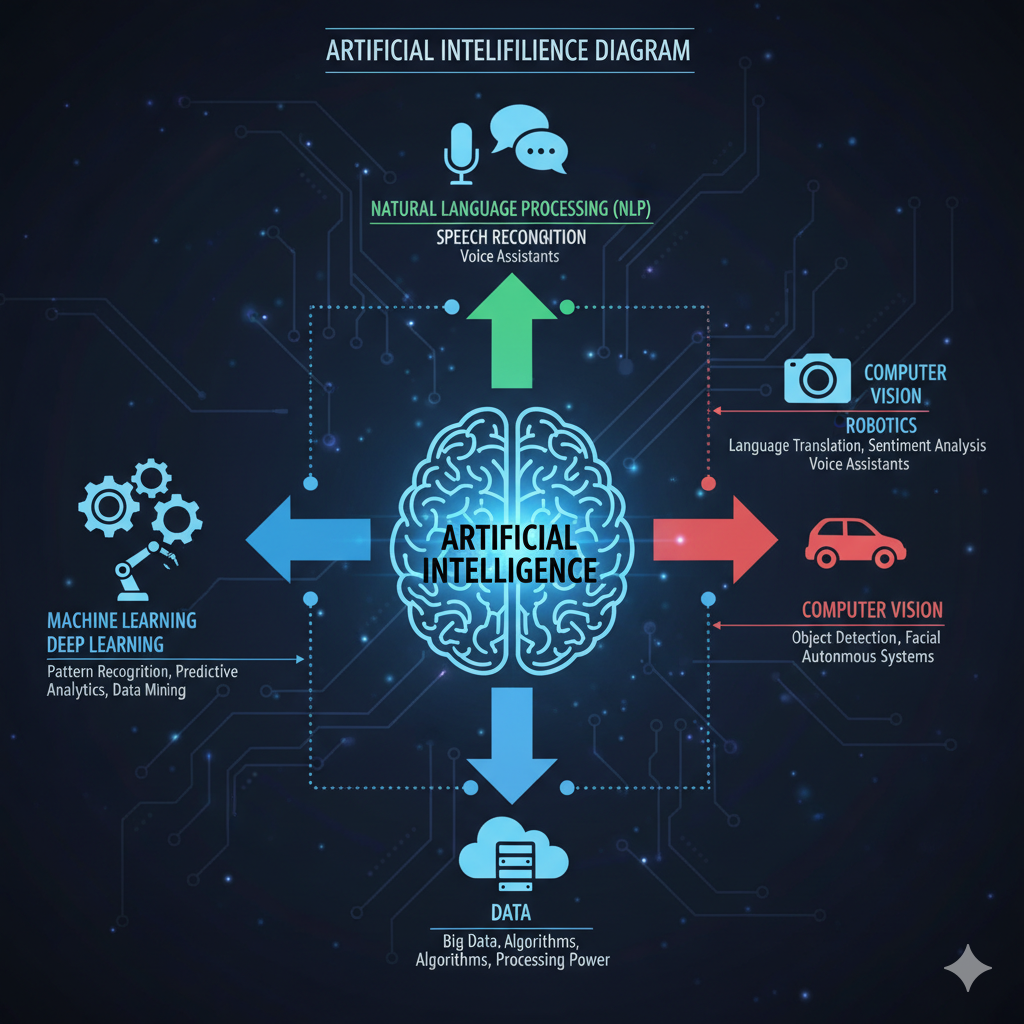Course Overview
Artificial Intelligence (AI) is transforming industries worldwide. This mini-course provides a beginner-friendly introduction to AI, covering its core concepts, applications, tools, and ethical considerations. By the end of this course, learners will gain practical knowledge and confidence to explore AI further.
Learning Outcomes:
- Understand the fundamentals of AI and its history.
- Explore different types of AI and their applications.
- Learn basic AI tools and programming concepts.
- Recognize ethical implications and best practices in AI.
- Apply AI concepts to real-world scenarios.
Lesson 1: Introduction to Artificial Intelligence
Learning Objectives:
- Define Artificial Intelligence and understand its significance.
- Learn the history and evolution of AI.
- Identify key AI applications in everyday life.
Content:
Artificial Intelligence refers to machines or software systems designed to mimic human intelligence. From Siri and Alexa to self-driving cars, AI is all around us. Understanding the basics of AI provides the foundation for further learning in machine learning, neural networks, and deep learning.
Key Takeaways:
- AI is more than robotics—it’s about intelligent problem-solving.
- Early AI milestones include Turing Test and expert systems.
- Everyday AI includes recommendation engines, chatbots, and virtual assistants.
Lesson 2: Types of Artificial Intelligence
Learning Objectives:
- Differentiate between Narrow AI, General AI, and Super AI.
- Understand the scope and limitations of each type.
- Learn examples of real-world AI implementations.
Content:
- Narrow AI (Weak AI): Designed for specific tasks (e.g., Google Search, Netflix Recommendations).
- General AI (Strong AI): Hypothetical AI with human-level intelligence.
- Super AI: Future concept where AI surpasses human intelligence.
Key Takeaways:
- Most AI today is Narrow AI.
- General and Super AI remain theoretical but are actively researched.
Lesson 3: Core Concepts of AI
Learning Objectives:
- Understand machine learning, deep learning, and neural networks.
- Learn the differences between supervised, unsupervised, and reinforcement learning.
- Explore AI data requirements and model training.
Content:
AI is powered by data and algorithms. Machine Learning enables systems to learn patterns from data. Deep Learning, a subset of ML, uses neural networks for complex tasks like image recognition and natural language processing.
Key Takeaways:
- Data quality is critical for AI accuracy.
- Neural networks mimic human brain function.
- AI learning types: supervised, unsupervised, reinforcement.
Lesson 4: AI Tools and Platforms
Learning Objectives:
- Explore popular AI tools like TensorFlow, PyTorch, and OpenAI APIs.
- Understand AI development platforms and frameworks.
- Learn about beginner-friendly AI tools for experimentation.
Content:
AI development requires tools and frameworks. TensorFlow and PyTorch are widely used for building machine learning models. For beginners, platforms like Google Colab and OpenAI provide interactive environments to experiment with AI projects.
Key Takeaways:
- TensorFlow and PyTorch are industry standards.
- OpenAI APIs make AI accessible for developers.
- Experimenting with AI strengthens learning.
Lesson 5: Ethics and Future of AI
Learning Objectives:
- Recognize ethical concerns in AI development.
- Understand bias, transparency, and accountability in AI systems.
- Explore future trends and career opportunities in AI.
Content:
Ethical AI ensures fairness, transparency, and accountability. Bias in datasets can lead to discriminatory AI outputs. The future of AI includes autonomous systems, advanced NLP, and AI-powered healthcare. AI skills are increasingly in demand across industries.
Key Takeaways:
- Ethical AI is essential for responsible technology.
- Careers in AI include AI engineer, data scientist, and AI researcher.
- Continuous learning is key as AI evolves rapidly.
Conclusion
This mini-course provides a structured introduction to AI, offering learners foundational knowledge, practical insights, and awareness of AI’s ethical and societal impact. Start exploring AI today to unlock new opportunities in technology, research, and business.
